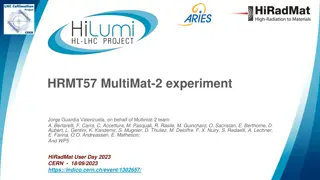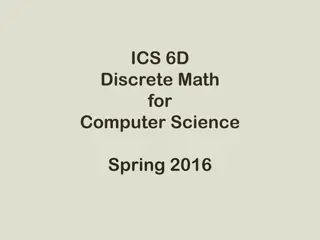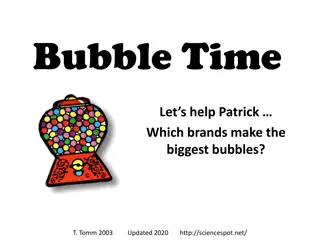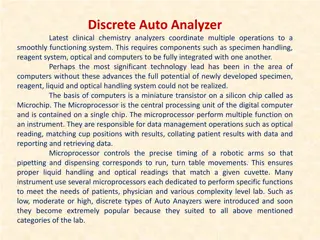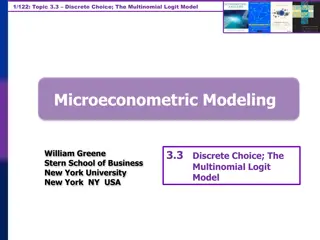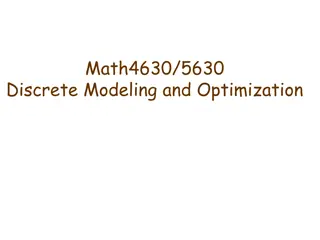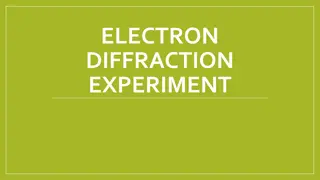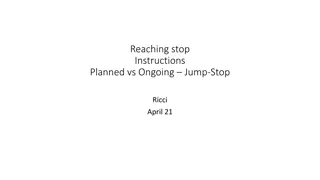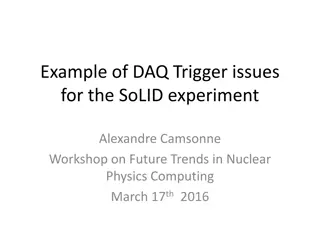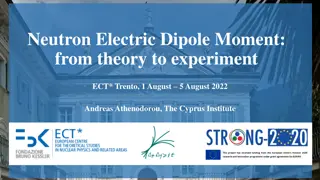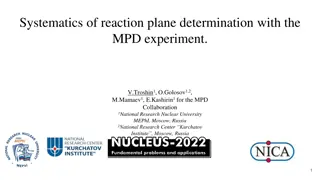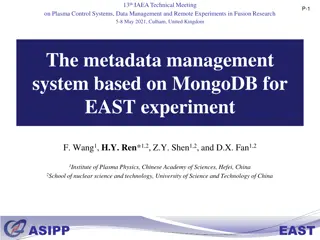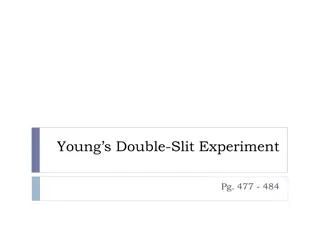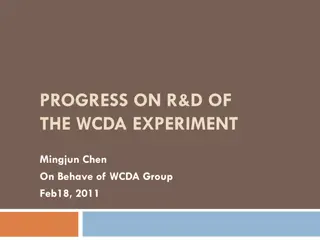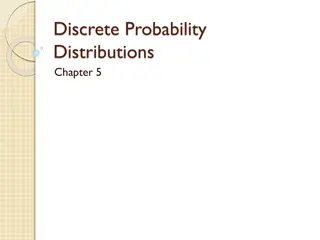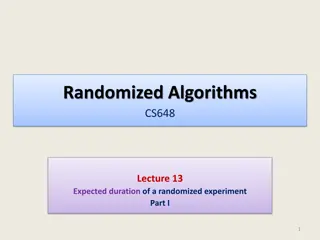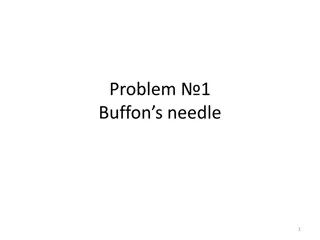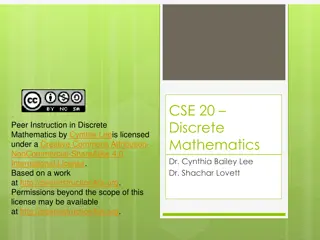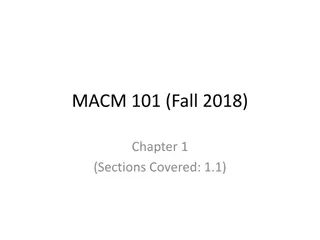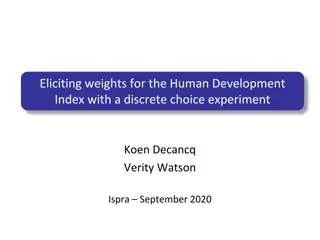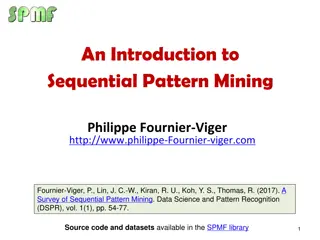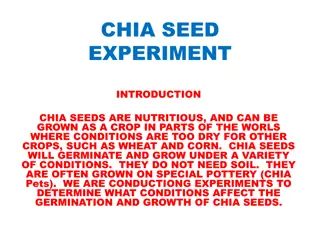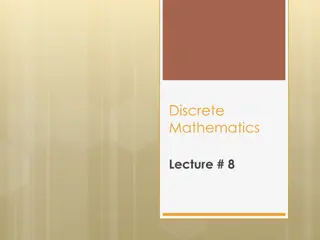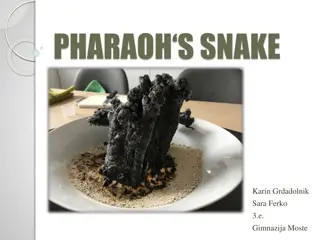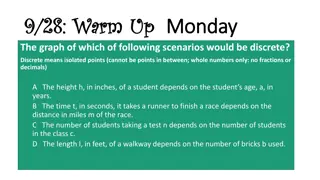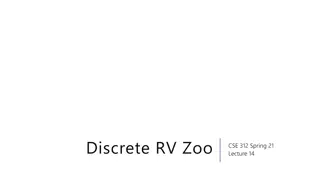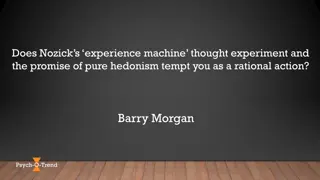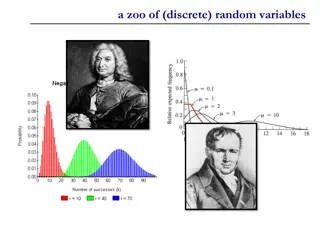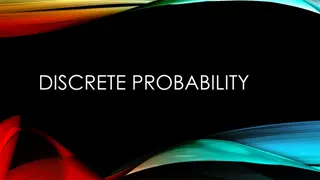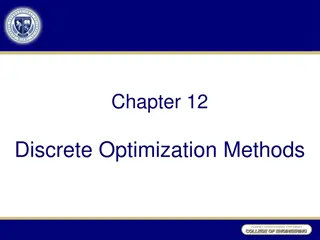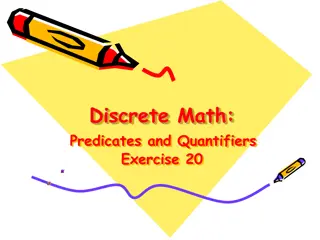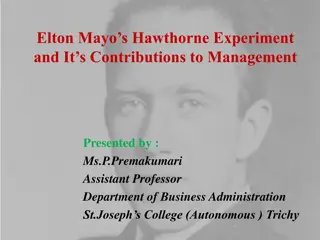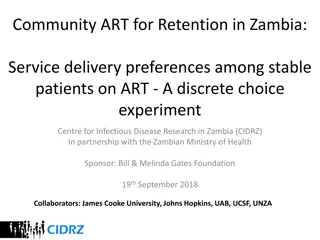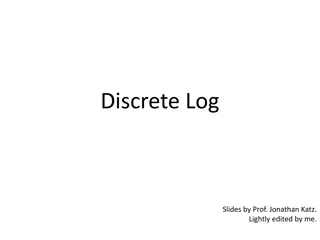Multimat-2 Experiment: Advancements in HL-LHC Collimator Technologies
The Multimat-2 experiment conducted by Jorge Guardia Valenzuela and the team at CERN focused on testing prototypes of HL-LHC collimators, including materials and coatings, to improve the robustness and performance under extreme conditions. The goals included deriving strength models, exploring failu
0 views • 13 slides
Aspirin Assay by Direct Acid-Base Titration Experiment Overview
Exploring the process of assessing aspirin purity through direct acid-base titration using sodium hydroxide as a standard solution. The experiment includes details on aspirin properties, dosage, acidity, decomposition, and metabolism. Key aspects covered include the aim of the experiment, the princi
5 views • 15 slides
Discrete Math for Computer Science Course - ICS 6D, Spring 2016
Prof. Sandy Irani leads the ICS 6D Discrete Math for Computer Science course at UC Irvine. The course covers various topics in discrete mathematics, with lectures on Mondays, Wednesdays, and Fridays. Teaching assistants and readers support the course, which includes interactive activities on zyBook.
5 views • 32 slides
Discovering the Best Bubble Gum Brand for Big Bubbles Experiment
Patrick wants to blow the biggest bubbles in Bikini Bottom, and you can help by conducting an experiment to determine which of the four bubble gum brands he should use. Identify variables, control factors, and set up the experiment to test bubble blowing ability, gum brand, technique consistency, an
0 views • 11 slides
Understanding Public Hospital Patient Preferences for Quality and Choice in Australia
The study explores whether Australian public hospital patients would choose a higher quality hospital if given the option. Through a discrete choice experiment, researchers investigate if patients prioritize quality over convenience when selecting public hospitals for elective surgeries. Findings re
0 views • 20 slides
Advancements in Discrete Auto Analyzers for Clinical Chemistry Operations
Discrete auto analyzers integrate specimen handling, reagent systems, optical components, and computers for streamlined functionality. The innovation in computer technology, particularly microprocessors, has revolutionized these analyzers, enabling precise data management, liquid handling, and optic
0 views • 17 slides
Microeconometric Modeling with Multinomial Logit Model
The topic discusses the Multinomial Logit Model in the context of discrete choice modeling, covering concepts, models, consumer preferences, utility maximization, and implications for discrete choice models. It explores how consumers maximize utility under budget constraints, the need for well-defin
1 views • 58 slides
Understanding Discrete Optimization in Mathematical Modeling
Discrete Optimization is a field of applied mathematics that uses techniques from combinatorics, graph theory, linear programming, and algorithms to solve optimization problems over discrete structures. This involves creating mathematical models, defining objective functions, decision variables, and
0 views • 12 slides
Exploring Wave-Particle Duality in Electron Diffraction Experiment
Delve into the fascinating world of wave-particle duality through an electron diffraction experiment that reveals the dual nature of particles and waves. By investigating the wave characteristics of electrons and measuring their De Broglie wavelength, this experiment sheds light on the fundamental p
1 views • 12 slides
Mouse Cursor Movement Experiment Overview
The experiment involves moving the mouse cursor to different targets on the screen in three phases: Practice pt. 1, Practice pt. 2, and Main experiment. Participants need to ensure a comfortable setup and proper mouse settings for optimal performance. Detailed instructions and setup requirements are
0 views • 23 slides
Understanding DAQ Trigger Issues in SoLID Experiment
Explore DAQ trigger challenges faced in the SoLID experiment through examples, including trigger goals, data readout specifics, and experiment setups. Learn about managing high luminosity, reducing data rates, improving signal quality, and handling bottleneck issues for effective data acquisition. D
0 views • 22 slides
Workshop on Neutron Electric Dipole Moment: Theory to Experiment
Workshop on Neutron Electric Dipole Moment: Theory to Experiment will be held in Trento from August 1st to August 5th, 2022. The event aims to bridge the gap between theory and experiment in investigating the neutron EDM in Lattice QCD, Phenomenology, and Cosmology. Renowned speakers and financial s
1 views • 10 slides
Systematics of Reaction Plane Determination with MPD Experiment
An investigation into the anisotropic transverse flow in heavy-ion collisions at Nuclotron-NICA energies, focusing on the MPD experiment's capabilities in studying momentum anisotropy and collective expansion effects through sophisticated tracking and particle identification systems. The experiment
0 views • 12 slides
Metadata Management System for Fusion Research Experiment Data
The metadata management system based on MongoDB for the EAST experiment addresses the challenges posed by the increasing size and complexity of experimental data. With a focus on resource organization and user accessibility, this system streamlines data management, enabling quick insights into the v
0 views • 15 slides
Understanding Young's Double-Slit Experiment and Interference Patterns
Thomas Young's double-slit experiment in the late 1700s provided evidence of light behaving as a wave, showcasing interference patterns. This experiment challenged the particle theory of light and supported the wave theory. The interference patterns observed helped scientists grasp the wave nature o
0 views • 27 slides
Progress on R&D of the WCDA Experiment
This report details the progress of the Water Cerenkov Detector Array (WCDA) experiment conducted by Mingjun Chen on behalf of the WCDA Group. It includes information on the introduction to the experiment, R&D of the Water Cerenkov Detector Unit, measurement of muon events, water quality control, pr
0 views • 47 slides
Understanding Discrete Probability Distributions
Explore the definition of random variables, probability distributions, and three types of discrete distributions - Binomial, Hypergeometric, and Poisson. Learn about the mean, variance, and standard deviation of probability distributions, as well as the difference between discrete and continuous dis
3 views • 32 slides
Expected Duration of a Randomized Experiment: Coupon Collector Problem Analysis
Explore the fascinating Coupon Collector Problem, where distinct coupons are randomly selected from a bag until each has appeared at least once. Dive into the analysis of the expected number of iterations required for all coupons to be collected, shedding light on the gradual transition through disc
0 views • 33 slides
Exploring Buffon's Needle Experiment for Estimating Constants
Buffon's Needle experiment involves dropping sticks on a surface with parallel lines to estimate a mathematical constant. By calculating the probability of the sticks crossing the lines at various distances, comparing results using the Buffon theorem, and determining inaccuracies, the experiment aim
0 views • 16 slides
Buffon's Needle Experiment: Probability Estimation through Sticks Crossing Lines
Buffon's Needle Experiment involves dropping sticks on parallel lines to estimate a mathematical constant through the frequency of the sticks crossing the lines. The experiment explores the theoretical introduction, probability calculations, equipment setup, and hypotheses related to accuracy and pr
0 views • 26 slides
Exploring Discrete Mathematics through Graph Theory
Delve into the world of discrete mathematics with a focus on graph theory. Learn about graphs, their properties, and essential theorems. Discover how graphs model relations in various applications like network routing, GPS guidance, and chemical reaction simulations. Explore graph terminology, theor
0 views • 26 slides
Investigation on Detection of Food Adulteration in Chemistry
This chemistry investigatory project focuses on detecting food adulteration through various experiments. Experiment-1 aims to detect adulterants in fat, oil, and butter, while Experiment-2 investigates adulteration in sugar. Experiment-3 aims to detect adulterants in chili powder, turmeric powder, a
0 views • 18 slides
Understanding Combinatorics in Discrete Mathematics
Combinatorics, a key facet of discrete mathematics, explores the arrangement of objects and finds applications in various fields like discrete probability and algorithm analysis. The Rule of Sum, a fundamental principle, dictates how tasks can be accomplished when they cannot be done simultaneously.
0 views • 70 slides
Eliciting Weights for Human Development Index with Discrete Choice Experiment
A study conducted by Koen Decancq and Verity Watson in September 2020 explores the process of eliciting weights for the Human Development Index (HDI) using a discrete choice experiment. The research delves into the trade-offs individuals make between different dimensions of the HDI, providing insigh
0 views • 46 slides
Introduction to Sequential Pattern Mining Overview
Discover the concept of sequential pattern mining, a popular data mining task introduced in 1994, with a focus on analyzing discrete sequences to find interesting patterns. Sequential pattern mining involves finding frequent subsequences in sets of discrete sequences, such as items purchased by cust
1 views • 24 slides
Chia Seed Experiment: Investigating Germination and Growth Factors
Chia seeds are nutritious and versatile crops that can thrive in dry conditions. This experiment aims to explore factors influencing the germination and growth of chia seeds. The hypothesis, procedures, and control groups are detailed to guide the experiment, which involves testing the impact of wat
0 views • 8 slides
Brandywine School District School Choice Information Session
Brandywine School District is hosting a School Choice Information Session featuring Superintendent Lincoln Hohler, CFO Jason Hale, and Choice Coordinator Stacy Karpinski. Learn about Delaware's School Choice Program, open enrollment dates for the 2021-2022 school year, choice priorities, and require
0 views • 14 slides
Understanding Valid and Invalid Arguments in Discrete Mathematics
Concepts of valid and invalid arguments in discrete mathematics are explored through examples. Learn how to determine the validity of arguments based on premises and conclusions. Practice using truth tables to evaluate argument forms. Enhance your logical reasoning skills in Discrete Mathematics.
0 views • 22 slides
Pharaoh's Snake Experiment Procedure and Video Links
This content provides a detailed overview of the Pharaoh's Snake experiment conducted by Karin Grdadolnik and Sara Ferko from Gimnazija Moste. It includes images of the experiment setup, reagents, and procedure. The experiment involved measuring chemicals, using sand, sugar, baking soda, ethanol, an
0 views • 5 slides
Discrete Scenarios in Graphs
The scenarios where the height of a student depending on age, time taken in a race depending on distance, number of students taking a test depending on class size, and length of a walkway depending on number of bricks are analyzed to determine which would result in a discrete graph with isolated poi
1 views • 23 slides
Understanding Discrete Random Variables and Variance Relationships
Explore the concepts of independence in random variables, shifting variances, and facts about variance in the context of discrete random variables. Learn about key relationships such as Var(X + Y) = Var(X) + Var(Y) and discover common patterns in the Discrete Random Variable Zoo. Embrace the goal of
0 views • 27 slides
Evaluation of Nozick's Experience Machine Thought Experiment
Nozick's Experience Machine Thought Experiment explores the choice between a machine providing endless pleasure experiences and real-life existence. The debate centers on the value of living a fabricated reality versus embracing challenges and uncertainties in the pursuit of genuine fulfillment. Whi
0 views • 10 slides
Understanding a Zoo of Discrete Random Variables
Discrete random variables play a crucial role in probability theory and statistics. This content explores three key types: Bernoulli random variable, binomial random variable, and error-correcting codes. From understanding the basics of Bernoulli trials to exploring the application of error correcti
0 views • 27 slides
Understanding Discrete Probability in Experiments
A trial is a single event with possible outcomes, while a sequence of trials forms an experiment. For example, flipping a coin results in outcomes like heads, tails, or on edge, creating a sample space. This concept delves into the essence of discrete probability and how it applies to various experi
0 views • 63 slides
Discrete Optimization Methods Overview
Discrete optimization methods, such as total enumeration and constraint relaxations, are valuable techniques for solving problems with discrete decision variables. Total enumeration involves exhaustively trying all possibilities to find optimal solutions, while constraint relaxations offer a more tr
0 views • 80 slides
Predicates and Quantifiers Exercise Solutions in Discrete Mathematics
Exercise solutions involving predicates and quantifiers related to printer status, job status, and queueing in a discrete mathematical context. The solutions address scenarios like lost jobs, busy printers, queued jobs, and out-of-service printers. References to textbooks in discrete mathematics are
0 views • 4 slides
Understanding Elton Mayo's Hawthorne Experiment and Its Impact on Management
Elton Mayo's Hawthorne Experiment at the Hawthorne Works revealed that emotional factors were more significant than logical factors in influencing productivity. The experiment consisted of four parts: Illumination Experiment, Relay Assembly Test Room Experiment, Mass Interview Programme, and Bank Wi
0 views • 11 slides
Service Delivery Preferences Among Stable HIV Patients in Zambia
A study conducted in Zambia explored the service delivery preferences of stable patients on antiretroviral therapy (ART) through a discrete choice experiment. The research focused on the benefits of differentiated service delivery, gaps in knowledge regarding patient preferences, and demographic cha
0 views • 9 slides
Understanding Cyclic Groups and Discrete Logarithms
Exploring the concepts of cyclic groups and discrete logarithms in group theory. This presentation covers the definition of generators, examples of cyclic groups, important theorems related to prime orders and cyclic groups, uniform sampling in cyclic groups, and the discrete logarithm problem. Exam
0 views • 14 slides
Analysis of Fakes on Trial Experiment Conducted by NSW Department of Education
The NSW Department of Education conducted an experiment called "Fakes on Trial" to explore concepts of probability and experimental outcomes. The experiment involved students predicting coin toss results, calculating probabilities, and comparing observed results with theoretical probabilities. Throu
0 views • 11 slides
